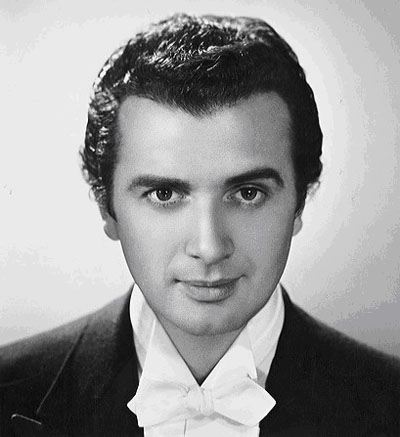
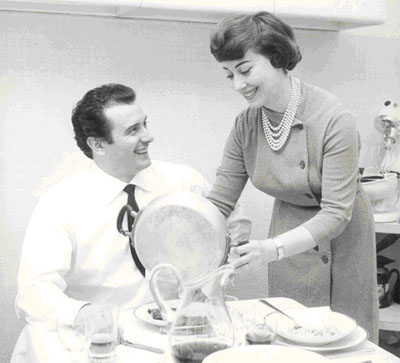
FRANCO CORELLI: a fan’s personal reminiscences
I remember well the moment I first heard the name of Franco Corelli. I even remember the name of the radio announcer who did it (Jeanneke Sneyers). I was fourteen years of age when during the weekly Sunday Opera and Belcanto broadcast on Flemish Public Radio she announced that a “young and promising tenor of La Scala” would be one of the stars of Flemish Radio Opening Concert of the Brussels World Fair of 1958. My father commented: “Such a concert with a Scala tenor is not for blue collar people like us.” He was correct as the concert was by invitation only. The World Fair opened on the 17th of April at De Heizel (suburb of Brussels) but the concert took place on Sunday Evening the 20th. For one or another reason we had kept it in mind as we rather liked great singing of great arias by great singers (no complete opera performances however; too long and sometimes too boring). This was a family trait. One of the few happy reminiscences of my death-poor grandmother had been that unbelievable evening in 1909 in Oostende (Ostend in English). As one from downstairs she had to accompany the upstairs ladies to the Kursaal for a recital by another Italian tenor. She couldn’t enter of course and had to wait at the very entrance of the house, together with other servants. But as it was extremely hot the doors were not closed and she heard the “organ voice” (her words) of Enrico Caruso. On his turn my father was a child of the thirties and he would never miss a movie by The Three Tenors (Jan Kiepura, Joseph Schmidt, Richard Tauber); entering the movie house at 2 p.m. and leaving at 8 p.m., after having watched those movies at least three times. After the war their place in the movies was taken by one of the greatest natural voices of the century. I am not sure which was the first movie I ever saw but it was either The Flame and the Arrow (with opera lover Burt Lancaster) or else Toast of New Orleans with Grayson and Lanza. For several years “Be My Love” became my preferred song. As a child I remember going to the movies to watch the Melba biography with Patrice Munsell and several movies with Germany’ Rudolf Schock. So, though we already had a TV-set, it was not amazing we remembered the appearance of that young promising tenor on radio.


The concert was typically for the time. Nowadays you will get a great classical soloist or there will be an evening of environmental pollution by one or several pop groups. In those days there was still an hierarchy. First there came some music by the Flemish Radio Orchestra. Then it was time for popular music, which then meant hit songs by an international star appreciated by everybody between 18 and 88. The singer was Vico Torriani, a now almost forgotten Swiss full of vivacity and with even a little bit of vocal talent. Next was an American world star Hazel Scott, though I’m sure almost nobody in Flanders had ever heard of her. I honestly cannot say I remember a thing of the concert up to that moment. Probably we watched TV which then often ended at 10 o’clock and didn’t even broadcast on Monday. But as a producer-reporter at the same Flemish Public Radio and TV I later looked up the programme in the archives. By 10 p.m. I was in bed as that was the normal hour for 14 years old guys before another school day. But my father softly called my name to know if I was still awake and then invited me to come down for another half hour as the concert was to close with the classical part. The young promising tenor was announced and sang an aria from Tosca. I do not know if it was Recondita armonia or E lucevan le stelle (probably the last one) as the archives only mention Tosca. Next was an aria from La Favorita. Same problem. Spirto gentil or Una vergine ? Probably the latter as he had recorded it for Cetra. The archives only mention Turandot too but here I’m 100% sure it was Nessun dorma as I knew the aria and had never heard of Non piangere, Liu. In my reminiscences the tenor sounded like the magnificent youthful Cetra-recording of 1956 I was to discover one year later. I was not the only one who was flabbergasted. The concert took place at the Groot Auditorium of the World Fair; a house explicitly built for the Fair and therefore demolished some months later (Only the Atomium and the American Pavilion, later transformed into a TV-studio where I would often work, are the survivors of the Fair). The audience, all dignitaries and their wives were, as is usual, rather cold during the whole evening; that means till the moment the promising tenor opened up. The applause was huge and after Nessun dorma the house came down. The guests thought they would listen to a good Italian tenor and they unexpectedly got the most spectacular post war tenor voice. The responsible producer told me later every artist was warned that no encore could be given to avoid friction and jealousy and to finish the concert in time. But the normally cold Flemish audience didn’t let the tenor go. So in a kind of impromptu moment Franco Corelli agreed to sing Granada with piano accompaniment only as there were no orchestral scores available. Many years later I would often speak with Etienne Vanneste, the producer of the operatic part of the concert. Though he later boasted he had succeeded in luring Corelli to Flemish Radio, he admitted that at the time he had not a very good idea who the tenor was. That was quite normal. There was no internet and international communication about opera was rare. When I first spoke with Vanneste in 1965 I discovered that Flemish Radio didn’t even have subscriptions to either Opera Magazine or Opera News. Etienne told me had contacted an Italo-Antwerp impresario and asked him for a good though not too expensive tenor (from La Scala of course; a tenor who didn’t sing at La Scala was not a real tenor). Del Monaco, Di Stefano and even Tagliavini were out of the question: too expensive as radio could only pay small fees. So the Antwerp impresario probably contacted Bonardi or Bauer and asked for a good strong tenor (to contrast with the female soloist Hazel Scott). He probably asked for a healthy cut of the fee too and he probably played upon the honours of the evening; almost surely mentioning “Belgian Radio” though he knew there is no such thing and not telling the tenor he would only be heard in Flanders, then so much poorer than Wallonia. As at that time we didn’t have a tape recorder, I asked Etienne what he had done with the official radio tape. I got a vague answer. It couldn’t be rebroadcast as there were copyright problems and then Etienne immediately changed topics. At the time I believed him but when I became myself a TV-producer (with some radio programmes as well) I knew he had not been very truthful. As the concert went live, there is even the possibility no recording was made. If there was one, it was given to the producer as till the end of my radio days (1992) there unbelievably existed no rule for a producer to hand over the tape to the archives. In the chaos of Etienne’s office I would not be surprised he simply used the tape to record some later concerts (when he unexpectedly died in 1973, his successor –on purpose- had all later operatic concerts wiped out as quote tape is too expensive unquote. Lost were concerts with Ugo Benelli, Augusto Vincentini, Beniamino Prior, Marcella De Osma, Bianca Berini, Piero Cappuccilli, Eugenio Fernandi, Rita Orlandi etc etc). Up to now only the encore of Granada has popped up, due to the collecting powers of the editor of Opera Nostalgia. By the way, I later discovered that Leontyne Price too had given a concert during the Fair. No doubt, wiped too.
One year later consumer society came to our home. A TV-set and a fridge were already there but as my father finally earned more than the necessary money for rent, food and clothes there was some room for luxuries like a real radio (instead of cheap cable radio with only five radio stations) and a pick-up. Records were horribly expensive in those days. My father had to work a whole day to buy an LP and therefore complete opera recordings were out of the question (remember, too long and boring anyway). We started out with a Bohème-Highlights (Callas, Di Stefano), went further with Faust-Highlights and returned it to the shop as the Soldier’s Chorus was not included and continued with Callas-Di Stefano in Cav/Pag-Highlights (we didn’t dare to return it though the intermezzo was not included). Therefore we were quite surprised to hear that in Brussels there was a market place (“de aa met” in Brussels Dutch dialect; official name Vossenplein) where a lot of classic records were sold more cheaply; mostly records the distributing companies deleted so they could clear their shelves more quickly in those days when record buying became more and more popular. So up we went to Brussels, attended mass in the church at the Vossenplein (they played opera music during the service) and then took a look at the many stalls in open air during a magnificent day. And there we saw that 10 inch record on Cetra: Franco Corelli, tenore; a name we vividly remembered. We handed it to the seller to have it played and all at once the most impressive Ch’ella mi creda ever recorded sounded over the market. I still remember how silence grew around the stall. The aria finished, the seller immediately took an EP from a customer’s hands and “Oh Carol, I’m but a fool, darling I love you, why are you so cruel “ blasted forth. Everybody, including the prospective Sedaka-buyer, had to laugh at the contrast.
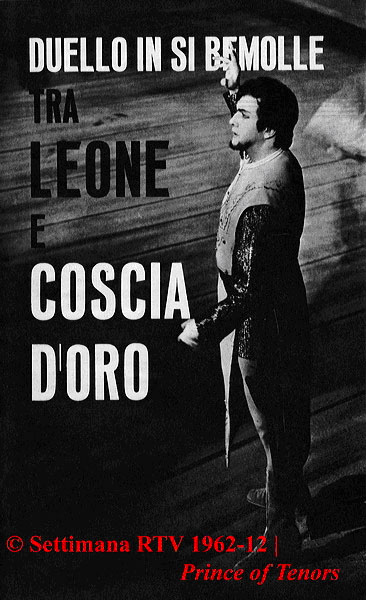
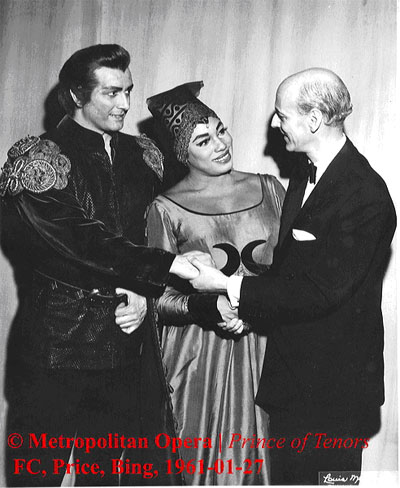
That record clinched it. The voice sounded even more impressive than Lanza’s; more powerful, with a nice vibrato, more style than the American tenor had and seemingly with even more splendid and long held high notes. Up to then I could still appreciate popular singers like Edith Piaf or the German Freddy Quinn and I already heartily disliked Americans like Presley, Avalon, Anka etc. The Corelli record made it clear; this was the kind of voice and the kind of music I wanted to hear. One year later a small tape recorder made its entry into our home. So I started to record the many opera programmes on radio. I even got to appreciate complete performances. But the one great and often played record remained that Corelli-record where I first met strange titles like Adriana Lecouvreur, where I discovered that Turandot had more than one aria and where I was sure that E lucevan was the cry of someone desperate in prison (I still didn’t know the story of Tosca). For three years I listened to every programme on Flemish, Dutch and Walloon radio and nothing new by Corelli was forthcoming. I wrote to my later colleague Etienne Vanneste and asked him if he didn’t have more information. He replied that there existed only that one small record. According to him Corelli was at the Met where he sang in ……La Traviata. If one man would know, it was Vanneste I thought and therefore I resigned myself to waiting, taping and listening to other singers and gradually discovering they had talent too and not only the tenors. It resembled somewhat “Waiting for Godot”. In my last year at high school I returned home, ready to listen to Walloon radio. For once my tape recorder was not set up when the announcer said: “aujourd’hui on présente une nouvelle intégrale de Paillasse (“Oh ! I’ve already got the complete Gigli version and that will do” I thought) avec dans le role principal le jeune ténor Italien..Franco Corelli.” I’ve rarely been more quick in my reaction to tape a broadcast.
A few months later the Mechelen book and record library burned out. As a student I worked there for over three months, got to know a lot of people and was happy when the new library offered far more possibilities. I had spoken to the people of the recording library and told them of my devotion for that great though almost unknown Italian tenor. Well, they ordered that small record and a few weeks later said to me that it was no longer available. “And did I know these ?” I still remember the shock when they showed me 2 Cetra LP’s (the Verdi recital and the Recital Operistico) which I had never known existed. At my Mechelen library too I finally discovered The Gramophone and so learned of the existence of a monthly called Opera Magazine. And once the wheels started to churn, everything went fast. I discovered all and every Cetra-recording, collected Corelli’s new recordings now that he was an EMI-artist and slowly and gradually realized he was not the only tenor in the world and sometimes not even the best. In Verdi roles I gradually liked Bergonzi more. His sixties records were fine but still I liked him somewhat more in his Cetra days. Partly this was the fault of stereo recordings. As all big voices Corelli’s didn’t record too well. Sound engineers often looked more for balance with lesser voiced sopranos like Freni than for exact reproduction. Only when one played these versions at the loud end of sound spectrum did one get a true impression but this was almost impossible in our tiny working class house. Then there was the evolution in the tenor’s road too. The voice was smoother (I missed the vibrato somewhat), often more beautiful from the middle register on but grating in his lower notes as a consequence of his lowered larynx method. I was far more impressed with a few live recordings which I purchased with an Italian. There the weight and the splendour of the voice was far more outspoken. My mouth fell open when I first heard his Poliuto recording where in the aria “Sfolgorante divino raggio” he sails on to a high D; maybe the most impressive live singing ever recorded. And though he had his Raoul in Gli Ugonotti heavily cut (which I was not aware of) his singing of the big duet with Simionato was nothing if not miraculous. My beloved first Corelli MP went into the cupboard and only emerged at moments of some celebration or crisis (getting my teacher’s diploma, leaving for the army, succeeding in an examination at Flemish TV, farewell to Hilde).
From 1968 onwards I went on an almost yearly Italian pilgrimage. At Ricordi’s (then still a hundred metres from La Scala) I bought Corelli’s Melodie e Canzone, not available in Flanders at that moment, and my most cherised Bergonzi-recording: Canzone di ieri ed oggi (still not on CD, a shame). And then it was time for my first Verona-performance: an unforgettable Trovatore with Bergonzi, Cappuccilli, Gencer. Naturally I returned to Verona the following year. In 1970 I literally decided on the spur of the moment to drive to Italy, accompanied by a friend. And then there was that unforgettable weekend. On Friday Raina Kabaivanska, Giulio Fioravanti and young Placido Domingo sang in Manon Lescaut (and people who have not heard Domingo live at the end of the sixties, beginning of the seventies often have no idea how beautiful he sounded). On Saturday there was the rewarding La Traviata with Scotto, Zanasi and Bergonzi (far better looking when not in medieval attire and singing like an archangel). After the performance I drove back to our camping at 2 a.m. And then out of the Alps came a storm that hurled along the Garda lake. After midnight one couldn’t normally enter the camping but this time the guard told me to drive on and put the car (Volvo Amazon) in front of the tent as a wind shield because the wind had already played havoc with other tents. I duly did and we survived. Next day there was a small rain now and then while sometimes a bleak sun would appear. It was one of the most nerve racking days of my life. In the evening it was still not clear how the weather would turn out when I drove to Verona. My friend accompanied me and we took place on the prima gradinata. A German father and his two beautiful daughters were seated in front of us. My friend didn’t speak German and was somewhat unhappy that instead of talking up to the girls I was more interested in the father. But he knew a lot about the weather and reassured me that those clouds were only “Schäferwolke” and no danger at all for the performance to start. As it was August the opera started at 9 p.m. And a quarter of an hour later I had the feeling I had surpassed Moses (unless some later friends; stern Corellistis who would never hear him in the flesh and thus never enter the promise land). After an absence of 8 long years Franco Corelli was back in Verona in his favourite role: Don José. Well, one knows how he looked: the dream of every operatic director at the time. The most magnificent tenor ever to appear upon a scene: lean, romantic, tall (though bass Giovanni Fioani, deep booming impressive voice and sadly under recorded, was even a few inches taller). And there was the tenor voice so well known from records; big, cutting, clinging to his high notes as long as possible. In my heart of hearts I had to admit however that after all his sense of style was somewhat lacking. After “Il fiore che avevi a me tu dato (everything was still sung in Italian) the arena exploded but by now the tenor’s sense of pacing was stronger than in his youthful exuberant days. He didn’t give an encore and the Italians hurled their abuse at….the conductor instead of the tenor though in those days at the arena even stern taskmasters as Molinari-Pradelli always allowed an encore if the singers wished to sing it. In the fourth act Corelli sang Don José as we know from his live recordings (though not as he sang it in the magnificent RCA recording): sobbing his heart out. At the very end of the opera after the normal “mia Carmen adorata”, he decided to improve on Bizet’s score and launched into a long held “Carmééééééén” on a high B. C’est magnifique mais ce n’est pas Carmen.
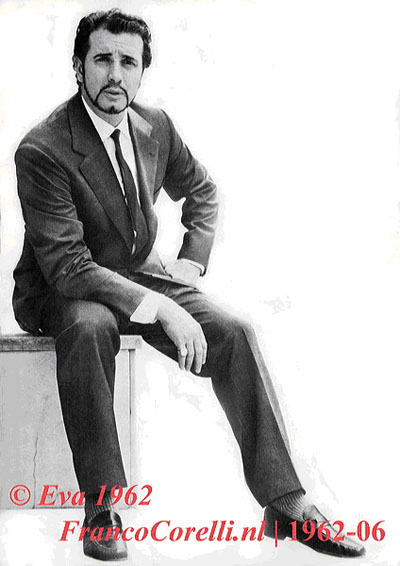
A few months later I discovered an ad in Opera Magazine by a certain Ed Rosen. The guy pretended he had a treasure trove of live recordings which he would gladly share in exchange for the necessary dollars. So for several years I became a good customer for his tapes. I ordered all missing Corelli items not recorded commercially like Ernani, Don Carlos, Battaglia, Gioconda etc. and each time I was struck how much better the voice sounded live than on records. Somewhere in 1972 or 1973 I ordered Corelli’s Werther and I immediately realised his time had come. The voice had become drier; the breath was remarkably shorter and he sang with great outbursts of sound and without much legato. And as I already knew from his fine 1968 Met Forza he had become more or less his own conductor; sometimes almost recomposing his parts for comfort or impact. I nowadays can only pity those Met conductors whose only task was to follow Mr. Corelli in his endeavours. In 1975 I heard and saw him for the last time: once again in Carmen. He looked quite a bit older (he was already 54) but I was not very surprised at the decline of the voice. During the first act there was not much metal in the sound; it came without resonance and at the Dragon d’ Alcala there still was a wobble. Then came Il fiore and he went at it with claws and teeth. The arena came down and the Italians were screeching their heads off. Well, I could understand them. They didn’t only applaud for a middle aged tenor but for their youthful memories as well as several people around me reminded everyone of his first appearance (in the same role) in 1955. So as a loyal fan I joined them. For minutes we clamoured for an encore while he sat kneeled in front of his Carmen (Viorica Cortez) but as he didn’t make a movement to repeat the aria the conductor continued the opera and of course abuse was hurled upon him and not upon the tenor. And then the incredible happened. Gradually, there came more sheen upon the voice; he found back his eternal breath and he completely dominated the big ensemble at the end of act 3. He was magnificent in the last act, this time without the interpolated Carméééén. The reviewer of Opera Magazine who was at the performance, wrote: “the old magic worked again.” Normally I left the arena as fast as possible to avoid traffic jams but this time I stayed till the last of the cast’s greetings (there were no solo calls then). Instinctively I think I knew this would be the last time I (and all his other fans as well) would see him. I was especially happy as this time my beautiful wife was with me so that she too had heard and seen the Caruso of my youth. Indeed, after these Verona performances Corelli simply disappeared, did not sing his Met performances and only emerged one year later at Torre di Lago for his final two operatic appearances; clearly totally unprepared, probably without practice for a whole year and sounding like someone who was doing a parody on Corelli. When the applause at my performance ended my wife and I left and I know I said loudly “ ciao, Franco, ciao. Thanks for everything.”
Jan Neckers, Operanostalgia